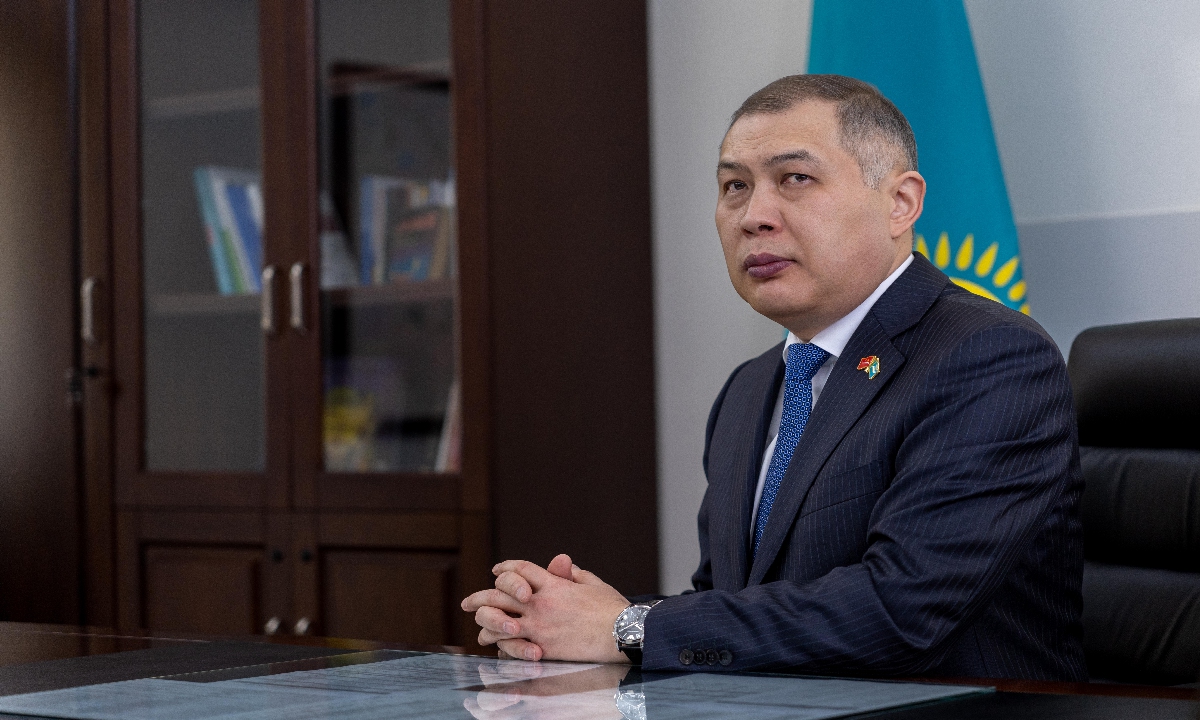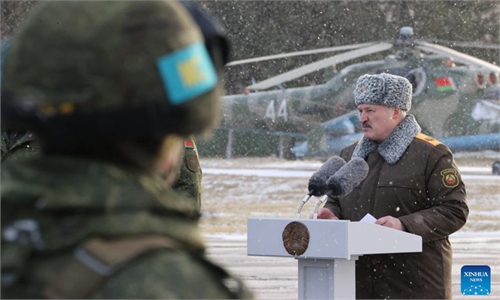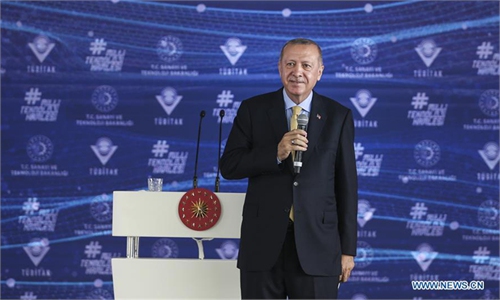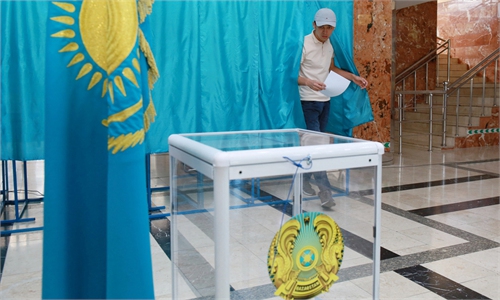IN-DEPTH / DIPLOMATIC CHANNEL
Central Asia-China cooperation crucial to regional security and development: Kazakh ambassador (exclusive full interview)

Kazakh Ambassador in China Shakhrat Nuryshev Photo: Courtesy of the Embassy of Kazakhstan in Beijing
Editor's Note:This year marks the 30th anniversary of the establishment of diplomatic relations between China and Kazakhstan. China was one of the first countries to recognize the independence of Kazakhstan in January 1992, and China-Kazakhstan relations have withstood the tests of time over the past 30 years, with the two sides having established a permanent, comprehensive, strategic partnership. As key member states in the Shanghai Cooperation Organisation (SCO), China and Kazakhstan look forward to cooperating in ensuring regional security, fighting against terrorism, separatism, and extremism, and in enhancing economic coordination under the China-proposed Belt and Road Initiative (BRI) amid the current uncertainty being seen in the global supply chains. In his first exclusive interview since embarking on his second term as ambassador of Kazakhstan to China with the Global Times (GT) reporter Sun Haoran, Shakhrat Nuryshev (Nuryshev) said that Kazakhstan highly appreciates the level of Kazakh-Chinese strategic partnership which is considered a benchmark of interstate relations with great stability enough to weather any challenges.
GT: Chinese State Councilor and Foreign Minister Wang Yi paid a visit to Kazakhstan between June 6 to 9, during which he said China and Kazakhstan have agreed to jointly build bilateral relations in the "next golden 30 years". What is your evaluation of China-Kazakhstan relations in the past 30 years, and what are your expectations for their cooperation in the future?
Nuryshev: First of all, let me thank the Global Times' editors for this interview. I'm so pleased, having become the Ambassador of Kazakhstan to China for the second time, to share with you my vision of the development of Kazakh-Chinese cooperation in the new era.
As you've noted, the current year in bilateral relations has been marked by a landmark event - the 30th anniversary of diplomatic relations between Kazakhstan and China. After China became one of the first to recognize the independence of Kazakhstan on January 3, 1992, our countries then established diplomatic relations. Since then, a new page was turned in the history of Kazakhstan-China cooperation.
Kazakhstan highly appreciates the level of Kazakh-Chinese strategic partnership which has been achieved over three decades, which can justifiably be called a benchmark of interstate relations with great stability against any challenges.
By historical standards, this is certainly not such a long period, however, political trust and business partnership between Kazakhstan and China have reached a very high level. Our countries have no unsettled issues and no political discord. This factor creates favorable conditions for the dynamic development of trade and economic relations.
Trade turnover between our countries has increased 70-fold over a 30-year period, which amounts to more than $25 billion, according to China's customs statistics. And this is not the limit, there are huge opportunities for increased bilateral trade. Now, for these purposes, our countries are actively cooperating in search of new opportunities to develop cooperation amidst the coronavirus pandemic and other global challenges.
Kazakhstan is interested in enhancing bilateral cooperation, and in building mutual trust, friendship, and good neighborliness with China. An active political dialogue at a high level always characterizes our cooperation, and this year, despite the ongoing pandemic, the degree of dialogue is reaching previous, pre-pandemic levels.
From this perspective, the "diplomacy of the heads of state" and the close personal relations of the leaders of our countries play a special role. In January this year, the heads of state held a virtual meeting, after which they held offline talks in Beijing as part of the grandiose Beijing 2022 Winter Olympic Games.
A lot of agreements, the practical implementation of which is contingent on the foreign services of the two countries, have been reached. In this regard, the recent visit of member of the State Council, the Minister of Foreign Affairs of the People's Republic of China, Mr. Wang Yi was very symbolic to have been made during this period of time.
The visit once again demonstrated the high level of bilateral relations and the steadfastness of the principles they are built on - good neighborliness, friendship, and mutual benefit. Views have been thoroughly exchanged on the entire wide-ranging cooperation. The parties have made progress in addressing issues of ensuring regional security, increasing trade, and in developing economic, investment, transport, and humanitarian cooperation.
Practical agreements reached on the gradual resumption of regular flights between the two countries, and the issuance of visas to citizens of both countries, including for students.
We believe that a possible visit by Chinese President Xi Jinping to Kazakhstan can give a new powerful impetus to the Kazakh-Chinese eternal comprehensive strategic partnership. Therefore, we very much hope that the coronavirus disease pandemic will end as soon as possible and the citizens of our two countries, including the heads of state, will be able, as before, to travel freely, paying visits to each other, and strengthen friendship and good neighborliness.
GT: As a key member state of the Shanghai Cooperation Organisation (SCO), Kazakhstan is to host the third China + Central Asia (C+C5) foreign ministers meeting in 2022. What is Kazakhstan's role in promoting relations between China and Central Asian countries?
Nuryshev: Being in the very heart of the Eurasian continent, Kazakhstan is interested in strengthening comprehensive and mutually beneficial cooperation with the countries of Central Asia and China.
Kazakhstan's multifaceted foreign policy is aimed at eliminating the rivalry of global powers in our region, and at creating powerful synergies through meaningful cooperation with all partners.
This was starkly illustrated by the results of the virtual summit of the heads of states of Central Asia and China on the occasion of the 30th anniversary of the established diplomatic relations in January 2022 and the third "Central Asia - China" Foreign Ministers meeting recently held in Nur-Sultan.
I would like to emphasize that in just two years the Central Asia-China dialogue has proven to be one of the most effective and promising platforms for comprehensive cooperation, capable of strengthening the atmosphere of trust, neighborliness, and the constructive search for mutually acceptable approaches to addressing urgent regional and international challenges.
In practical terms, agreements under the scope of the format have been reached to coordinate anti-COVID-19 pandemic efforts, jointly ensure regional security, protect digital data, and upgrade regional transport connectivity.
I see a huge potential for Central Asia-China cooperation, I believe it is important to actively use it in order to accelerate the development of intra-regional trade and economic processes, which will allow the region to become one of the core and dynamic growth centers.
Actually, this is what the "Roadmap for the Implementation of the Initiatives of the Heads of State of Central Asia and China" adopted in Nur-Sultan on June 8, 2022, is focuses on. The document should be an adequate response to the request to expand win-win relations between China and the Central Asian countries for the benefit of the peoples of our countries.
GT: Wang Yi said the two countries are deeply concerned about the serious negative spillover impact of the Ukraine crisis, and hope that Central Asian countries can stay focused and eliminate external interference and strengthen coordination. How can China and Kazakhstan cooperate to safeguard regional peace and stability?
Nuryshev: I would like to emphasize that this military conflict between two countries close to us resonates with pain in the hearts of the people of Kazakhstan.
Kazakhstan has historically established close political, economic, cultural, and people-to-people ties with Russia. Having the longest border in the world, we intend to maintain the established level of trade and economic cooperation with Russian partners. In general, our states are allies legally and politically, and are strategic partners. We are also interested in the early recovery of the high dynamics of broad mutually beneficial cooperation with Ukraine. Therefore, we sincerely believe that Moscow and Kiev will find a way to bridge their differences peacefully in the near future.
We always take the attitude of the need to keep the dialogue going even in the most difficult of situations. As it is known, President of Kazakhstan, K. Tokayev, had a telephone conversation with the presidents of both Russia and Ukraine, arguing both parties to find peaceful ways to resolve the conflict. Kazakhstan gives every assistance in peacekeeping efforts to finding ways to end the armed stand-off, address humanitarian problems, and ease tensions in international relations.
Here I would like to note that the use of any economic or political sanctions historically is not the most effective way to settle international disputes and conflicts. Therefore, Kazakhstan does not intend to join the sanctions pressure against any country and take actions that would be contrary to the sense of dialogue.
In that regard, I believe that, in order to protect our own national interests, it is necessary to make every effort to prevent these sanctions from having a serious impact on the development of our economies and the well-being of their peoples.
GT: In terms of external interference, especially by US-led forces that aim to force Central Asian nations to pick sides, what is Kazakhstan's position on this issue?
Nuryshev: In responding to this question, I would like to immediately draw attention to the fact that:
Firstly, the Republic of Kazakhstan is an independent, democratic, and legal state. It determines and pursues both domestic and foreign policy autonomously, building its relations with all states on the principles of international law.
Secondly, over the years of the country's independence, our country has reinforced its international standing, establishing itself as a peace-loving and open state, and a reliable global and regional partner. Kazakhstan implements a multi-faceted, pragmatic and proactive foreign policy, making a significant contribution to the formation and implementation of the global and regional security, cooperation, and development agenda.
Therefore, when making decisions, we primarily proceed from national interests and goals for the meaningful promotion of foreign policy and foreign economic priorities.
GT: China and Kazakhstan are actively promoting cooperation in the field of regional security both at the bilateral level and as part of the SCO and CICA. How do you assess the cooperation between the two countries in this area? How important is the security and stability support in Central Asia?
Nuryshev: Today, in the current context of international relations, the role of Central Asia is increasingly strengthening. The region holds a strategically important position in the Eurasian continent. The security of a number of neighboring countries depends on the stability and development of Central Asia. Therefore, Central Asia claims greater attention from world powers, especially in the wake of settling the problems of regional security and socio-economic development. China, neighboring Central Asian countries, as a regular member of the UN Security Council and one of the active participants in such regional mechanisms as the SCO, CICA (Conference on Interaction and Confidence Building Measures in Asia), and the 'CA-PRC' (Central Asia - People's Republic of China) format, plays an important role in supporting stability and security in the region.
In practical terms, within all these mechanisms, there is close cooperation, especially in the fight against the so-called "forces of the three evils" - terrorism, separatism, and extremism. For example, in the SCO Regional Anti-Terrorist Structure, the competent authorities of member states have been successfully counteracting the spread of destructive forces in the Organization's area of responsibility for a long period of time. In turn, the SCO's three-level mechanism for fighting against drug crime is effectively working to block channels of financing terrorism and drug trafficking. Even the military component of the SCO has a strong antiterrorist focus.
Within this framework, I also would like to focus on the significant opportunities of the Conference on Interaction and Confidence Building Measures in Asia. CICA has the necessary potential and matured experience to develop common confidence-building measures to fight against current challenges and threats in Asia.
Currently, Kazakhstan chairs CICA and promotes a number of initiatives so that the Conference plays an increasingly significant role in ensuring security and development in the region.
One of the main initiatives by Kazakhstan is the idea of transforming CICA into a fully-fledged international organization. This will propel our collective efforts to counter current challenges and threats to a qualitatively new level.
We are grateful to the Chinese side for its strong support of CICA's activities and significant contribution to the promotion of the Kazakh initiative to transform the Conference into a fully-fledged international organization.
GT: Kazakh President Kassym-Jomart Tokayev presented the "New Kazakhstan" economic policy in May, saying that Kazakhstan is an important and reliable partner for the China-proposed Belt and Road Initiative (BRI). Could you specify the fields in which China and Kazakhstan can coordinate under the framework?
Nuryshev: Yes, indeed, in a recent Address to the people of Kazakhstan, the President of the Republic of Kazakhstan, K. Tokayev, has brought forward a large-scale program of political modernization of the country with the main goal of a comprehensive transformation of the entire state model of development. Kazakhstan is undergoing a transition from a "super-presidential" government to a presidential republic with an influential parliament and an accountable government. These political reforms are being carried out on the sidelines of comprehensive economic reforms aimed at building a genuine market, free and competitive economy.
Amid a quite stressful international situation, the disruption of global supply chains, trade wars, and unprecedented inflationary pressure have become a fact of life these days. In such a climate, states and businesses need to quickly adapt to the new rules of the game so as to maintain their competitiveness.
The path to success here may be the expansion of trade and togetherness. China's BRI is well-timed in this regard. The initiative, in my opinion, has opened new doors for various states. The implementation of joint projects has enabled the dealing of such issues as the construction of new infrastructure facilities and industrial enterprises, the involvement of advanced technologies, and the creation of new jobs.
Actually, Kazakhstan, in the early 1990s, advocated for the Great Silk Road to be restored, and we did not hesitate to respond to the proposal by Chinese President Xi Jinping on the construction of the Silk Road Economic Belt, which was an important part of the BRI. By the way, 2023 marks exactly 10 years since the moment when, in September 2013, Chinese leader, Xi Jinping, presented this initiative in Kazakhstan for the first time.
Since then, new, ample opportunities have opened up for industrial and investment cooperation between Kazakhstan and China. Especially for these purposes, in 2014 we launched a joint program and created a mechanism for coordinating work in this field. Thanks to this, China has been among the five largest investors in Kazakhstan in recent years in terms of raised foreign direct investment.
Among the promising areas of cooperation with China, the development of the following fields is important: Logistics and transport as part of the integration of the development strategies of Kazakhstan and China; e-commerce and the expansion of the participation of Kazakhstani companies in Chinese electronic platforms; trade in environmentally friendly agricultural products; the strengthening of scientific exchanges and the expansion of contacts in the field of high technologies; further development of cooperation in industry and investment; the use of renewable and water energy, having consideration to be the focus of the decarbonization of the economy; the strengthening of the dialogue on cultures, and the intensifying of educational exchanges.
Moreover, it has to be said that the coronavirus disease pandemic, in general, has become a catalyst for the development of digital and IT technologies, "smart" solutions, more broadly so-called "new infrastructure", covering both material supplies and virtual supplies. We should take into account the successes and achievements of China in technological development and boost cooperation in this field.
GT: Some people in Kazakhstan have concerns about China's investment in the country, and some worry that growing anti-China sentiment may challenge the relationship between the two countries. What do you think China and Kazakhstan can do to alleviate people's distrust toward Chinese investment?
Nuryshev: I agree that in recent years there has been growing criticism of Chinese investment by some experts. Some conclude that the goal of the BRI is to establish China's dominance. It should be recognized that groups expressing such an opinion exist not only in our country, but also other foreign countries.
It is natural, that the dynamically developing Chinese BRI is perceived critically in many large states, and its scale, covering not just one region, but different continents, gives rise to concerns. At the same time, I believe that the accession of more than 180 countries of the world to the BRI is an indicator of the interest of the global community in it.
It has to be noted that raising foreign investment and involving advanced technologies plays an important role in the growth of the national economy. This is the law of the market economy. Chinese investment has become a global trend and a symbol of ensuring the healthy economic development of various countries around the world, including Europe, Asia, Africa, and Latin America. The governments and business community of many states welcome the extension of financial cooperation with Beijing. In turn, Chinese companies carefully and selectively choose partners who guarantee the safety and mutual effectiveness of investments. Kazakhstan is one such state.
I am sure that the negative arguments regarding Chinese investment will gradually decrease. This will be facilitated by the mutually beneficial implementation of investment projects, the social obligations of investors, as well as the production of a quality product from the cooperation of entrepreneurs who prioritize the welfare of the people and the prosperity of their state.
I thank the Global Times editors for the initiative and the opportunity to share with a wide audience of readers of your newspaper opinions on the current situation and prospects for the development of Kazakh-Chinese cooperation. Looking forward to new meetings!



